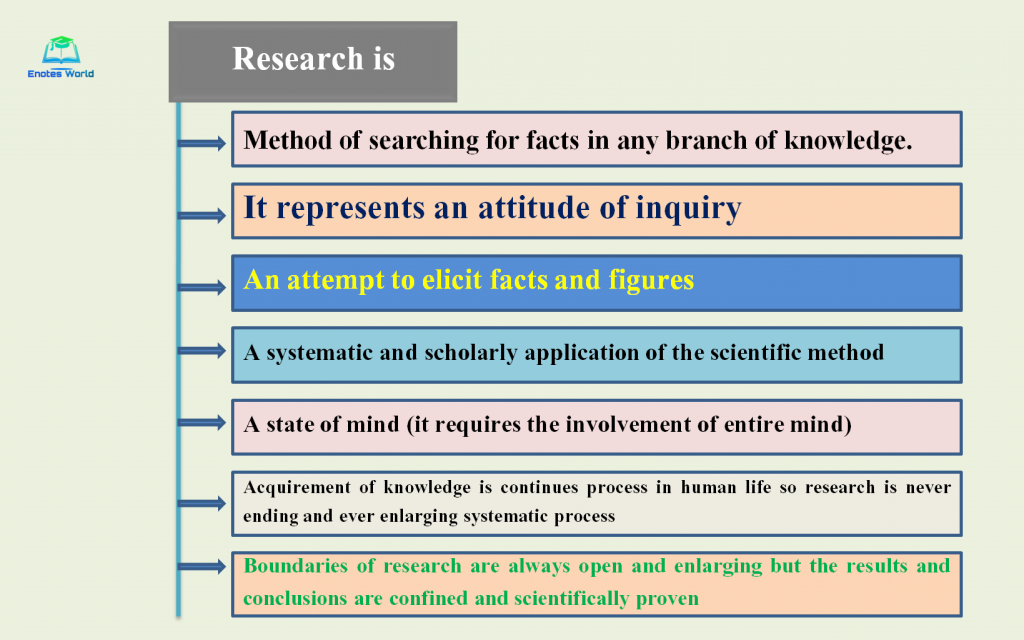The term research denotes a logical technique including enunciating the issue of problem, stating or formulating a hypothesis, collecting the data and facts, analyzing the data, and getting definite conclusions both in the shape of solutions relating to stated issues or indefinite generalizations for some theoretical construction. Thus it is search of a searched thing to elicit some facts out of the known thing.

In alternative words, research is a procedure that includes a sequence of steps needed to gather and examine the information to boost and amplify the understanding and consideration of a particular topic or issue. It involves major four steps as posing a question, setting a hypothesis, collecting data to analyze the posed issue, and presenting answers to the posed question. It is s method of searching for facts in any branch of knowledge. Good research has to contain all the essential characteristics of research.
Good research must have the following essential characteristics
Contents
Purposive
Research must be purposive. It means research must be conducted with a certain and definite aim, objective, and purpose. Moving forward in any research should be guided by stated objectives and purposes. Only the research having a certain purpose and objective will lead towards certain conclusions and destinations.
The purpose of research always determines where the researcher is now and where he or she wants to go. All the further proceedings in research should be according to purpose and objective. It means the research without a certain purpose may lead a researcher in the wrong direction and creates many errors in the entire voyage.
Controlled
Control in research refers to a methodology that is to be applied while conducting research. Conducting controlled research is easy in lab-based testing but it is very difficult to conduct controlled experiments in anthropology where factors affecting a relation cannot be controlled totally.
The variable or factors in a questionnaire related to a human being, human life, and their emotions are difficult to control as there is a deep relation between them. The rigorous control of factors and variables in social science research is very difficult. It is easy in pure science. Control is important in good research.
Rigorous
The process or procedure of research must be rigorous. It means the researcher must ensure that the procedure followed is relevant, appropriate, and justified. There should not be a conflict and doubt with regard to the relevance of the research taken by the researcher.
The degree of rigor may differ from one researcher to another and from one field of study to another. But there should be an acceptable degree of rigor in the method of study to call it research.
Systematic
The study or research process should follow a sequence that logically terminates in the result. The process of research has to be sequential and it has to follow certain predetermined and verified patterns and pathways. It is necessary because the customary procedure would mislead the result and waste resources.
Valid and verifiable
The research technique and process should be valid and verifiable. It means the conclusions drawn by research should be correct and should be duplicated while applying a similar procedure again and angina over time.
It is assumed reliable and having quality when it duplicates the results when the same procedure is followed again and again. Validity measures the applicability of research. Only valid research has good application. The validity of the research ensures reliability. Validity is more important than reliability.
Critical
Critical in research refers to the state of the method, finding, and conclusion of the research. The process of research undertaking and its finding should have full proof of critical reviews so that result will be justice worthy. If the research is containing any drawbacks it would not be called good research.
Critical appraisal of research means an act of carefully and systematically examining research and its all findings to judge its reliability, validity, trustworthiness, value, and relevancies if results are applied in a particular field or context. It is the last condition of finding evidence reliably and efficiently.
Empirical
It means the results and conclusions drawn upon are based on data or pieces of evidence collected from the subjects of research. The research should be based on observations, direct experimentation, or real-life experimentation by the researcher. The process or procedure in the research should be fully-proof and thus stands for critical appraisal.
Therefore, when we refer to a research or research study, it includes a systematic procedure, a process that is within a set of approaches, using techniques and methodologies that are already tested for its validity and reliability, and the outcome of the process/research is unbiased.
Here systematic procedure or approaches/methodologies means the fixed method. For example, it could be either qualitative or quantitative.
Similarly, the term reliability and validity refers to the accuracy of the procedures and quality of the procedure. Unbiased refers to the state in which procedure is freed from any kind of personal bias on the part of the researcher.
The degree of attainment of these criteria may vary from one person to another and from one discipline to another. But the absence of such a criterion does not qualify an activity to be known as research. Therefore good research should contain the above stated essential characteristics of research.
Very good information. Lucky me I found your site by accident (stumbleupon).
I have saved it for later!
Thank you!
This is fantastic! I have learned a lot from it. Thank you!
Beautiful.
Thanks this is very informative
Thank you, it helps a lot for my exam
Quiet informative.